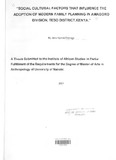| dc.contributor.author | Njoroge, Jane N | |
| dc.date.accessioned | 2013-05-07T08:57:46Z | |
| dc.date.available | 2013-05-07T08:57:46Z | |
| dc.date.issued | 2001 | |
| dc.identifier.citation | Master of Arts in Anthropology | en |
| dc.identifier.uri | http://erepository.uonbi.ac.ke:8080/xmlui/handle/123456789/19669 | |
| dc.description.abstract | This study focused on adoption of family planning. The major objective of the study was to examine
the social-cultural factors that influence the adoption of modern family planning. In particular, the
study attempted to describe: how social networks promote large family size; how cultural beliefs
promote large family size; how social cultural perceptions of the value of children promote large
family size and the process of husband and wife communication.
A sample of 100 respondents was drawn using the cluster sampling technique. The sampling frame
was a list of current residents of Amagoro who are married. Data was gathered using a structured
questionnaire and an interview guide containing short statements focusing on the key issues to be
investigated from the key informant and focus group discussion.
Findings suggested that Family planning is not a myth but a reality which has however, not been
put into practice. 100% of the respondents interviewed were aware of family planning. However,
only45% of them were practicing family planning. Most of the respondents (70%) approved of
family planning, but not all of them had taken the initiative to practice family planning. The data
revealedthat the social-cultural environment of these people to some extent does not favor the
adoption of family planning. The culture of these people for example holds high esteem on large
families; there are certain taboos associated with infertility and in the cultural fabric of the Teso
people, men have the ultimate say in matters concerning fertility and conception. Sons are highly
valued and before a couple bears a son the marriage is not complete. The Teso's are
predominantly Catholics whose principles are against adoption of modern family planning.
Basedon these findings, it is recommended that an integrated health care intervention be
implemented in a primary health care fashion which should be comprehensive to include
reproductive health and family planning as a basic component .It is also recommended that literacy
levels of the people be uplifted. Also Male involvement in family planning deserves profound
consideration. Finally members of the community should be mobilized to participate in all projects
aimed at improving their standard of living through indirect and direct participation. | en |
| dc.description.sponsorship | University of Nairobi | en |
| dc.language.iso | en | en |
| dc.title | Social cultural factors that influence the adoption of modern family planning in Amagoro division, Teso district,Kenya. | en |
| dc.type | Thesis | en |
| local.publisher | Institute of African Studies University of Nairobi | en |

